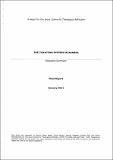January 2011 JCTR: The Taxation System in Zambia

View/
Date
2011-01-30Author
Jesuit Centre for Theological Reflection
Type
Annual ReportLanguage
enItem Usage Stats
42
views
views
20
downloads
downloads
Abstract
Taxes world over are mainly levied in order to raise revenue to fund government developmental operations and assist to reduce disparity between the rich and the poor and reduce poverty. This study was undertaken on behalf of the Jesuit Centre of Theological Reflection (JCTR), which is a research, education, and advocacy organization that promotes study and action on issues linking faith and social justice in Zambia. The Debt, Aid and Trade (DAT) programme of JCTR commissioned the study to comprehend the taxation system in Zambia with the aim of forming knowledgeable and evidence-based opinions on how it affects social justice.
Description
Increasing the tax take from wealth transactions can increase the tax base and allow the government to reduce the highly unequal burden on the formally employed, which is unfair and creates economic distortions. The closest tax that reflects wealth transaction in Zambia is the property transfer tax. However, this tax has not performed well because properties are mostly undervalued which negatively affects tax revenue realized from property transactions. The lack of well-trained tax inspectors in property evaluation compounds the problem and as such, tax evasion is common.